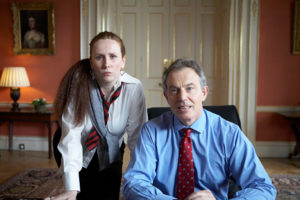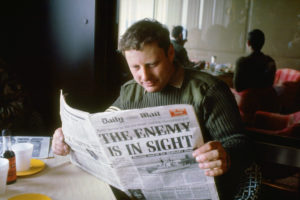“Ask Clarkson. Clarkson knows — people like fast cars, they like females with big boobies, and they don’t want the Euro, and that’s all there is to it.” This surmise, from Peep Show, captures the essence of Jeremy Clarkson’s Noughties appeal — approvingly for those who liked him, and scandalously for those who didn’t. The spawn and spokesman of the English male id. Insular, impudent and straightforward in taste. And if that weren’t enough, he was also into cigs, engines and the Second World War.
For the minority of a more severe, moralistic, and joyless disposition, this made him a national-psychological defect to be suppressed, or ideally exposed and exorcised. Before Piers Morgan, Nigel Farage or Donald Trump provided such stern competition, it was a small badge of honour on the Left to publicly hate Clarkson. But for many of us (probably a majority at his peak) he was a vulgar treat to indulge. For the length of a Sunday column or an episode of Top Gear, we could wallow harmlessly in the swamp of arrogant prejudice and self-gratification which sits at the bottom of the brain. At a time of minimal collective loyalty, the nation could reliably divide into those two tribes. Clarkson the monster, or Clarkson the geezer. Wokery vs blokery. A version of the same split is fuelling the current Clarkson row, but with the weight of opinion reversed.
Amazon, Clarkson’s primary current employer, now seems to have picked its side. His contract to make TV programmes about cars, farms and larks will reportedly not be renewed. There are rumours ITV may let him go too. We can suppose this is at least partly thanks to the nearly month-long storm over his astonishingly tasteless joke in The Sun about the Duchess of Sussex. For that, Clarkson has been granted no quarter by Harry, Meghan or their supporters. His first “rather put my foot in it” bumble was rejected. The Sun’s own “regret[ful]” memory-holing of the article was rejected. Even Clarkson’s last-gasp, hands-clasped grovel has been rejected, such is his history (they say) of “hate rhetoric”.
But his spiritual and popular appointment to the English is a far tougher thing to dismiss. He is, like it or not, quite a lot of us writ ludicrously, satirically large. Like a 21st-century John Bull: to paraphrase Auden, a self-confident, swaggering bully of meaty neck and clumsy jest. Whatever Clarkson’s professional fate, the question of whether our society can tolerate him has implications for the stomach and sensibility of the national character, of which he is a significant avatar and champion. And his rise and fall reads as a history of a changing English firmament, one in which public morality has come to supersede mere entertainment.
Plenty of time and work went into the germination of such a figure. Clarkson’s early life is a whistle-stop tour of the English class system. He was born rural, lower-middle class, Yorkshire. But, in a wonderful twist of fate, the Clarkson family came into money after his parents won the exclusive rights to sell Paddington Bear dolls, based on the ones they had made for him and his sister. With aspirational intent, Clarkson was sent to Repton, one of the North’s oldest private schools. There, he smoked, pranked and failed his way to expulsion, developing the likeable loutishness which is his career mainstay. And then he jumped social tracks again, entering the lowest rungs of the Fourth Estate at the Rotherham Advertiser.
A public schoolboy who can still boast that he crashed out of education with a C and two Us at A Level. The ingredients were in place for a broad, classless appeal. But Clarkson really came of professional age in the new meritocracy of Thatcher and Murdoch, a place where common touch came to supersede common background (something also exploited by Boris Johnson and Nigel Farage). It was an England of quick, coarse wit, and quicker, coarser money; of the triumphant red-top, and the unrepentant “lad”. It suited Clarkson perfectly. Flush with entrepreneurial spirit, in Eighties London he had the wheeze of syndicating car news and reviews from his own company to the regional press. It was a money-maker which introduced him to motoring journalism and eventually to the producers of Top Gear.
The programme was a staid, genuinely factual affair in those days. And Clarkson’s irreverence and wayward metaphors (a Porsche Boxster “couldn’t pull a greased stick out of a pig’s bottom”) set him apart. So cars led only further into showbiz, with a chat show, documentaries, newspaper columns and pop culture ubiquity to follow. By the time he reformatted Top Gear 20 years ago (and made it the BBC’s biggest global brand), he already had the privilege of being recognisable by silhouette alone. The stance: arms-crossed, in male-barbecuing or under-the-bonnet-inspecting mode. And the hair: the curly remnants of the kind of Englishman’s ‘fro which peaked in the Seventies.
England at the turn of the millennium was Clarkson’s home. It wanted entertainment, and it got it from the Victorian circus of Big Brother and X Factor, and from the sneers and stereotypes of Little Britain. Clarkson’s Top Gear, launched in 2002, was almost edifying by comparison. Its open secret was that it was not really about cars. Instead, Top Gear seemed to scoop the ersatz appeal of reality TV and gave you the life you wished you and your mates could live. All the rudeness, ribaldry and exotic travel you could want. And while clearly a masculine offering, 40% of viewers were women. English people weren’t just seeing their grainy selves mirrored back — in Clarkson and his lieutenants they saw a dream life.
Do they still? After multiple warnings — including for homophobia, xenophobia and the n-word — the BBC reached the end of its tether with the assault and abuse of a producer in 2015. Clarkson was initially undiminished. He was snapped up by a rich and ambitious streaming giant and instructed to make the same programme with more money. He took over Who Wants to be a Millionaire? and his collected journalism continued to be published (standing at eight volumes, the bestselling World According to Clarkson series must make its author the Proust of the pub bores). But the England that Clarkson once charmed was changing. Where once he was propelled by the forces of the contemporary, now he is encircled by them.
The principal feature of England in Clarkson’s imperial period was how apolitical it was. Electoral turnout fell; party memberships were tiny. Referendums proceeded according to plan. And the stability of New Labour’s long summer lent itself to a sense of consequence-free triviality. Under its aegis existed a crude cultural free-play. It was nasty, brutal and ephemeral, but in its own way quite funny, and even forgiving. So when, for example, he compared driving some svelte supercar to “smearing honey on Keira Knightley”, it was just good old Clarkson. Even when he said that striking workers should be “executed in front of their families” (a remark which yielded as many complaints as his Meghan column), it was, eventually and by enough people, forgotten.
But there has come a point when such lines aren’t provocative catnip anymore, but an embarrassing commercial risk. Once Clarkson could stomp on to any old landmine — from speed limits to lorry drivers murdering prostitutes — and walk away with his popular constituency intact. Now he’d find himself blown into the no man’s land of an interminable culture war. And his nose and instinct for provocation means he can’t keep clear of it. Even his bucolic “Farmer Clarkson” period landed him in the soup. Before this latest fracas, his farm restaurant was making headlines for irritating the Nimbys and planning laws of Oxfordshire, a foretaste of the coming clash over the ownership and purpose of the British countryside.
The rowdy, TV-tabloid moment Clarkson enjoyed is gone. The lives and affairs of the lowest celebrity, from footballer to stand-up, are no longer sub-political fun. And the subterranean Englishness Clarkson personified is on trial, its burly, vinegary instincts held responsible for Brexit and the politics of reaction it supposedly represents. Much of Clarkson’s constituency will dislike both Meghan and the gleeful violence of the column he wrote. But, in his apology to Meghan, Clarkson wrote that it is “hard to be interesting and vigilant at the same time”. It won’t wash with Harry or Meghan, but it will have spoken to his fans’ sense of alienation from the new set of rules that turned their hero into an ethical criminal.
Disclaimer
Some of the posts we share are controversial and we do not necessarily agree with them in the whole extend. Sometimes we agree with the content or part of it but we do not agree with the narration or language. Nevertheless we find them somehow interesting, valuable and/or informative or we share them, because we strongly believe in freedom of speech, free press and journalism. We strongly encourage you to have a critical approach to all the content, do your own research and analysis to build your own opinion.
We would be glad to have your feedback.
Source: UnHerd Read the original article here: https://unherd.com/




